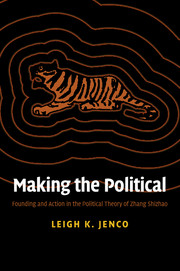Book contents
- Frontmatter
- Contents
- Preface
- Notes on the text
- Part I Introduction
- Part II Founding
- 3 The founding paradox
- 4 “Rule by man” and “rule by law”
- 5 Public, private, and the political
- Part III Action
- Conclusion: A return to beginnings
- Appendix A notes on translated terms
- Appendix B Character list
- Bibliography
- Index
3 - The founding paradox
from Part II - Founding
Published online by Cambridge University Press: 06 July 2010
- Frontmatter
- Contents
- Preface
- Notes on the text
- Part I Introduction
- Part II Founding
- 3 The founding paradox
- 4 “Rule by man” and “rule by law”
- 5 Public, private, and the political
- Part III Action
- Conclusion: A return to beginnings
- Appendix A notes on translated terms
- Appendix B Character list
- Bibliography
- Index
Summary
When Zhang Shizhao returned to China from Great Britain in 1912, he found himself in a very different place from the one he had left four years ago. In 1908, China was still governed by the Qing, though its elites were struggling to square new “Western” ways of governing with deeply entrenched habits and institutions that had survived nearly two thousand years of continuous imperial rule. In 1911, China became, in name at least, a republic, committed to the principles of self-rule embodied in Western theories of democracy, liberalism, and constitutionalism. Zhang should have been happy; this is what he had been advocating all along. In fact, Zhang knew more about the theoretical foundations of these Western institutions than perhaps anyone writing in Chinese at the time. Apparently, however, he did not know enough – not enough to explain why, after the provisional constitution was ratified in 1913, no one took it seriously; why, once human rights were recognized as keys to Chinese political regeneration by most elites, the government did not seem to be respecting them; why, once self-rule was declared after a short but violent revolution, no one seemed willing to stay in China and build parliaments, assemblies, and courts to replace the imperial bureaucracy that no longer existed.
Zhang quickly realized that there were deeper, more general questions at stake than simply what kind of regime to build. Confronting nearly total political collapse, Zhang mined both novel Western theories and long-standing Chinese debates to develop a rich theoretical vocabulary for exploring the sources of effective transformation, and establishment, of a political community.
- Type
- Chapter
- Information
- Making the PoliticalFounding and Action in the Political Theory of Zhang Shizhao, pp. 45 - 71Publisher: Cambridge University PressPrint publication year: 2010

